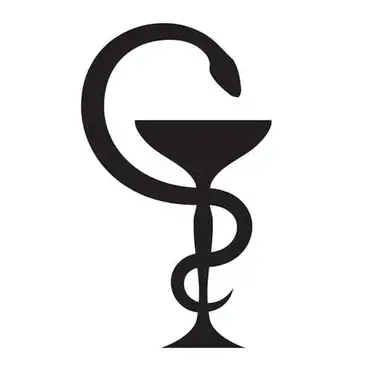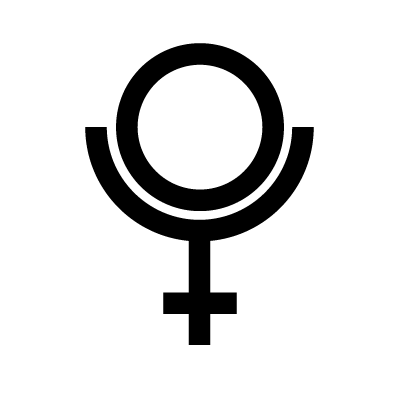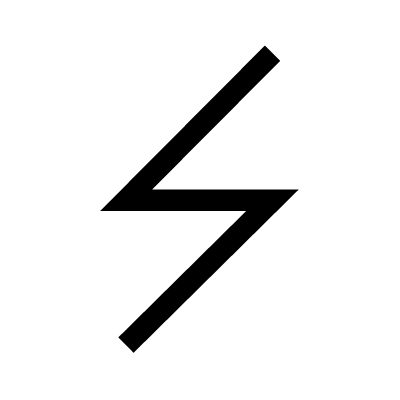Ancient Greece is filled to bursting with all manner of lore, epic poems, a pantheon of quirky gods and goddesses, and all sorts of notable figures and legends. It feels like everywhere you look, there’s something to find, or a hidden meaning to explore. Ancient Greece is a civilization that you can study your whole life, and still never find everything.
That said, we’ve condensed the history lesson into bite-sized chunks—specifically when it comes to symbology. The ancient Greeks loved their symbols, and would often use them wherever they could. While many of the meanings have been lost to time, there’s still quite a lot to explore in the world of ancient Greece. Here are some of the top ancient Greek symbols, and a little lesson about their meanings!
Asklepios

Let’s start with something interesting to get the ball rolling—this is the symbol of Asklepios, considered to be the god of medicine. The son of Apollon and a human princess, the latter unfortunately died during childbirth. As a result, the newborn god had to be cut out of the womb, which was how he got his name.
Asklepios took a shine on medicine, and when he was taught the art of saving lives, the god took it to an entirely new level and was able to resurrect the dead. While such a thing was an absolute revelation even among the gods, Zeus, the god of thunder and the sky, was furious. He felt it messed with the natural order of things, and so he ended up destroying poor Asklepios with a thunderbolt. That said, it still symbolizes the god of medicine and all it entails.
Hermes

The reason why Asklepios is the first on the list is due to a bit of irony. Have you ever heard of the Hippocratic Oath? It’s the oath that every physician swears by, and it got its start in ancient Greece through Hippocrates. It’s all about doing your best as a physician, and making sure that the needs of the patient go first. It’s about trying your best, and not being afraid to admit when you aren’t sure.
It’s the symbol of Hermes, the messenger of Zeus, and it’s also used as the symbol of the Hippocratic Oath. The reason why it’s ironic is that Zeus felt the need to destroy Asklepios for perfecting the art of medicine, yet the symbol of Zeus’ messenger is all about the pursuit of the perfection of medicine. It’s a strange cycle, and it showcases the odd nature of the king of Olympus.
Hera

This is the symbol of Hera, the goddess of women, marriage, childbirth, and family. Note that Hera is not the goddess of love, but much of what she governs has to do with love. The interesting thing about Hera is how much she resents her husband, Zeus, due to his lust for others—specifically many mortals. As the queen of Olympus, Hera demands respect, and she can be extremely vengeful if those demands aren’t met.
Many ancient Greeks feared the wrath of Hera, as she was one of the gods and goddesses who most commonly curse mortals. That said, she is also one of the most likely to grant mortals her favor. Considering how Zeus acts, no one can really blame Hera. As the king of Olympus, her husband has a habit of getting into all sorts of trouble. Those faithful to their wives have little to fear from Hera.
Iris

Not everyone is aware of Iris’ place in the Greek pantheon. In most cases, people know about the biggest players of Mount Olympus, but there are many more out there that deserve focus and attention. For example, this is the symbol of Iris, the messenger of the Olympian gods. She personifies the rainbow, as her symbol shows. Those who sought the favor of Iris would have direct communication with the gods and goddesses of Olympus, as Iris had the capability of going to and fro with the speed of the wind.
Iris’ father was a marine-god, and her mother was known as a cloud nymph. This union resulted in a goddess of both the sea and the sky. Such is the reason why she personifies the rainbow, as the bountiful rainfall is often attributed to Iris.
Pan

This particular god is the opposite of Iris in many ways, especially when it comes to popular media. Pan isn’t usually seen as a god along the lines of Zeus and the rest of the mighty pantheon. However, Pan enjoys quite a lot of attention in pop culture, having appeared in many different games, books, and movies. Pan is the god of the wild, shepherds and the flock.
One distinction Pan has over the other gods and goddesses is that he is often associated with fertility and sex. Pan is usually depicted as a cross between a faun and a satyr, complete with having the lower body and the head of a goat. In pop culture, Pan is depicted as being both wise and unwavering, much like nature itself. Pan is undoubtedly one of the most interesting gods in the pantheon.
Aphrodite

If Hera is the goddess of women, marriage, childbirth and family, Aphrodite is the goddess of love, beauty, and pleasure. In other words, Aphrodite represents the more pleasurable part of relationships, though that comes with its caveats. As with everything in life, it’s all about trying to balance things out. Without balance, everything comes falling apart, which is precisely why some gods and goddesses tend to act with reckless abandon.
In the case of Aphrodite, she’s considered the goddess of beauty, love, and even love-making, which meant she would do everything in her power to achieve those ends. She even had quite a lot of fun getting other gods and goddesses in the pantheon to fall in love with mortals.
Hygeia

This is the symbol of Hygeia, another lesser known goddess in the Greek pantheon. Askeplios, the god of medicine, is the father of Hygeia, the goddess of good health. When it comes to the companion of medicine, what’s the first thing that comes to mind?
For physicians, the greatest companion of medicine is sanitation and cleanliness, which are the qualities Hygeia rules over. She’s also often seen attending to Aphrodite—considering what that goddess is often up to, she’s lucky to have Hygeia around! Fortunately, while Zeus ended up destroying her father, he didn’t do the same with his daughter.
Hades

Of the gods and goddesses that could match up to Zeus in terms of raw power, there are only two to speak of—his brothers. Hades is the god of the underworld, and was responsible for the defeat of his father’s generation of gods and goddesses. When the cosmic dust settled, creation was free to be divided between the three brothers. Zeus received the sky, Poseidon received the water, and Hades, eldest of the three, received the underworld.
While Hades is often depicted in pop culture as something of an evil and sadistic god, he is neither. He is cold and unwavering, much like death itself.
Poseidon

This is the symbol of Poseidon, god of the sea and brother to both Hades and Zeus. A god of unspeakable power, Poseidon rules over the sea, where he’s said to reside in a beautiful underwater palace. When all of creation was divided between the three brothers, Poseidon was given all forms of water, both saltwater and fresh. When it comes to the sea, even Iris does not hold Poseidon’s domain.
You can see him as the senior god of the sea, similar to both Hades and Zeus in their respective domains. The symbol is that of the trident, which is the type of spear fishermen typically use when they go fishing.
Zeus

Last but certainly not least, we have the symbol of the big guy himself. Zeus has appeared in numerous stories throughout Greek literature and mythology, getting into all sorts of trouble and usually making Hera furious in the process. Zeus is perhaps the most human of the gods and goddesses, as he is the most flawed despite holding the most power.
It’s interesting how he resembles mankind the most in his desires and his penchant for trouble. There isn’t a god out there quite like Zeus, which is likely why he’s the king of Olympus. Love him or hate him, Zeus is undoubtedly one of the most interesting of the gods and goddesses.